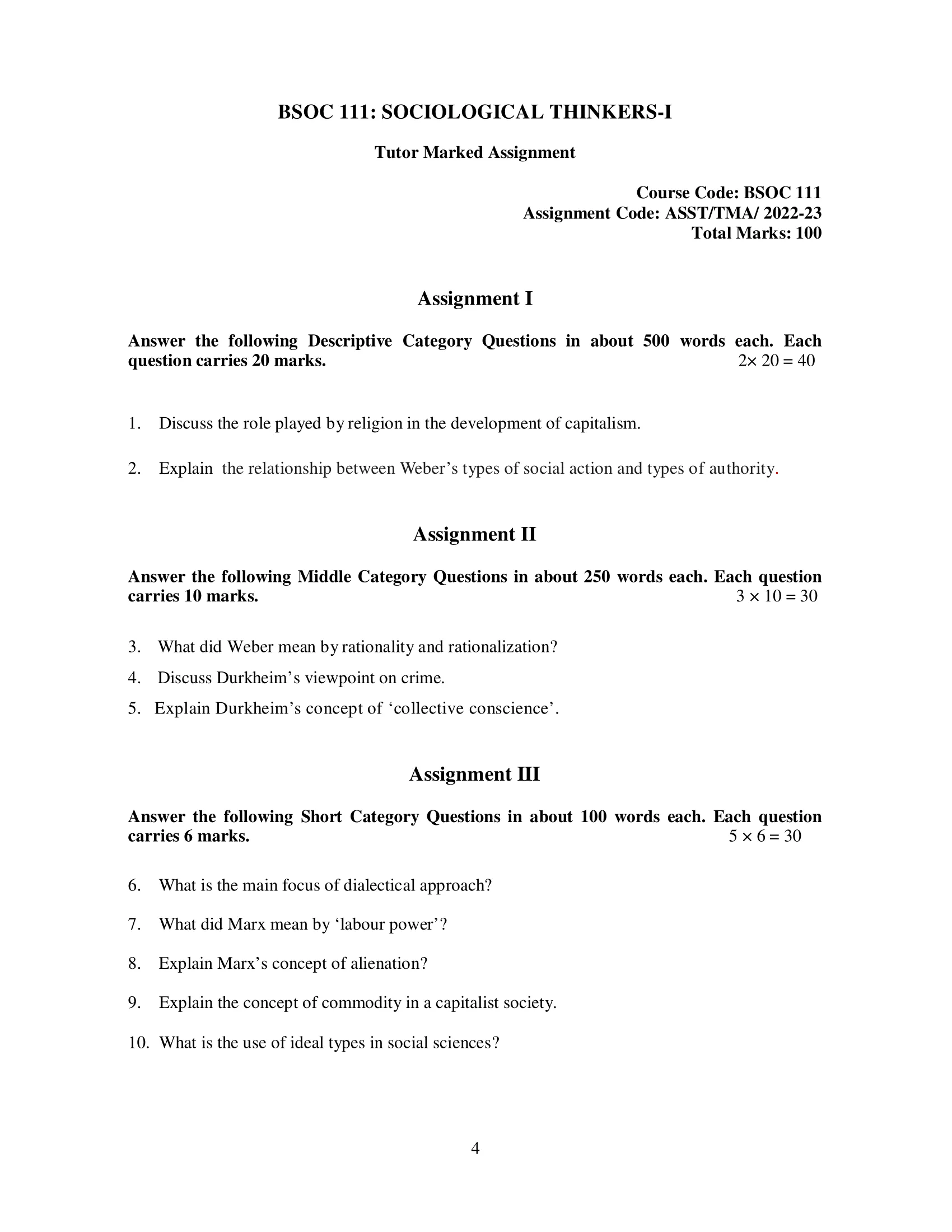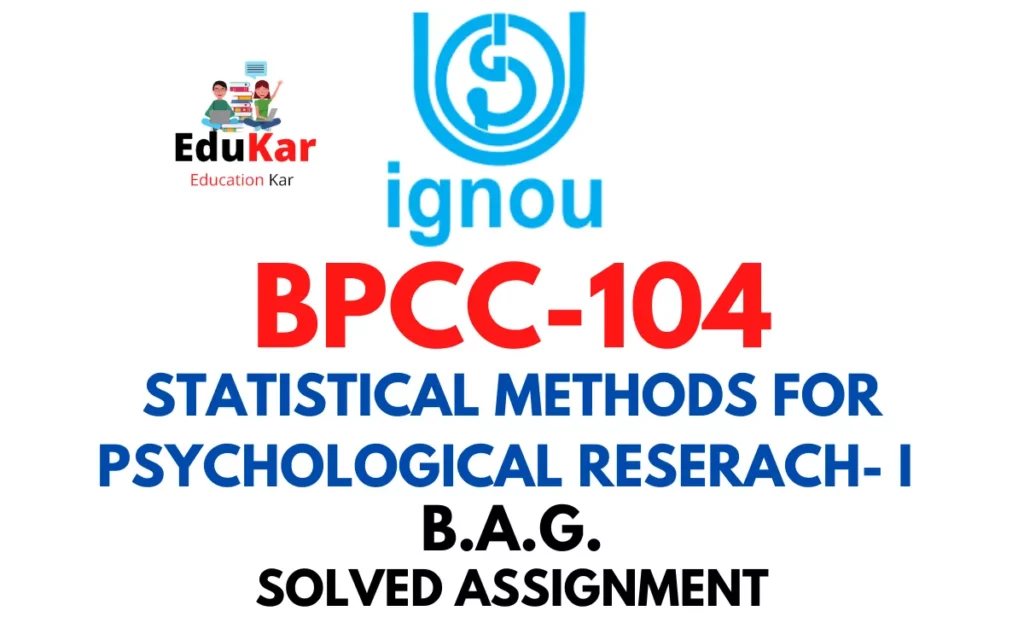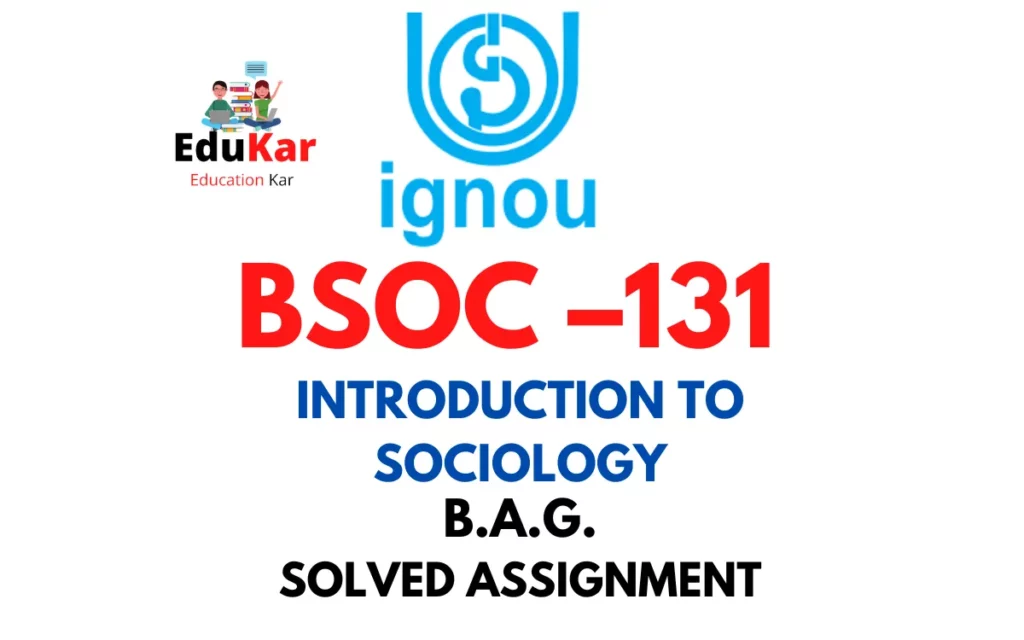Contents
- 1 Assignment I
- 2 Answer the following Descriptive Category Questions in about 500 words each. Each question carries 20 marks.
- 3 1. Discuss the role played by religion in the development of capitalism.
- 4 2. Explain the relationship between Weber’s types of social action and types of authority.
- 5 Assignment II
- 6 Answer the following Middle Category Questions in about 250 words each. Each question carries 10 marks.
- 7 3. What did Weber mean by rationality and rationalization?
- 8 4. Discuss Durkheim’s viewpoint on crime.
- 9 5. Explain Durkheim’s concept of ‘collective conscience’.
- 10 Assignment III
- 11 Answer the following Short Category Questions in about 100 words each. Each question carries 6 marks.
- 12 6. What is the main focus of dialectical approach?
- 13 7. What did Marx mean by ‘labour power’?
- 14 8. Explain Marx’s concept of alienation?
- 15 9. Explain the concept of commodity in a capitalist society.
- 16 10. What is the use of ideal types in social sciences?

| Title | BSOC-111: IGNOU BAG Solved Assignment 2022-2023 |
| University | IGNOU |
| Degree | Bachelor Degree Programme |
| Course Code | BSOC-111 |
| Course Name | SOCIOLOGICAL THINKERS-I |
| Programme Name | Bachelor of Arts (General) |
| Programme Code | BAG |
| Total Marks | 100 |
| Year | 2022-2023 |
| Language | English |
| Assignment Code | ASST/TMA/ 2022-23 |
| Assignment PDF | Click Here |
| Last Date for Submission of Assignment: | For June Examination: 31st April For December Examination: 30th September |

Assignment I
Answer the following Descriptive Category Questions in about 500 words each. Each question carries 20 marks.
1. Discuss the role played by religion in the development of capitalism.
Ans: The relationship between religion and capitalism has been a topic of debate among scholars for many years. Some argue that religion played a critical role in the development of capitalism, while others disagree. In this essay, I will discuss the role played by religion in the development of capitalism.
Religion is a cultural system that provides a set of beliefs, values, and practices that guide individuals in their daily lives. It is a central aspect of human culture and has played a critical role in shaping social, economic, and political systems throughout history. One of the most significant contributions of religion to the development of capitalism is its emphasis on individualism and the pursuit of economic success. This emphasis on individualism is evident in many religious traditions, such as Protestantism and Calvinism.
Max Weber, a German sociologist, argued that Protestantism played a significant role in the development of capitalism. According to Weber, the Protestant work ethic, which emphasized hard work, thrift, and the pursuit of economic success, provided the cultural foundations for the emergence of capitalism. In particular, Weber argued that Calvinism, a branch of Protestantism, had a profound impact on the development of capitalism. Calvinists believed in the concept of predestination, which held that God had already determined who would be saved and who would be damned. To the Calvinists, economic success was seen as a sign of God’s favor, and hard work was a way to demonstrate one’s faith and secure salvation.
The Protestant work ethic was also evident in other religious traditions, such as Puritanism and Methodism. These religious traditions emphasized the importance of hard work, thrift, and self-discipline, and they encouraged their followers to pursue economic success. The emphasis on individualism and economic success provided by these religious traditions created a culture that was conducive to the emergence of capitalism.
Religion also played a role in the development of capitalism through the creation of social networks and institutions. Churches and religious organizations provided a sense of community and social support for individuals, which was critical in the early stages of capitalism. These social networks and institutions helped to create trust and cooperation among individuals and provided a basis for the development of commercial relationships. In particular, religious organizations played a critical role in the development of credit markets, which were essential for the growth of capitalism.
Ans: Max Weber, a German sociologist, is widely regarded as one of the most important thinkers in the field of sociology. Weber’s ideas have had a significant impact on the development of social theory and his concepts of social action and authority are particularly important. In this essay, I will explain the relationship between Weber’s types of social action and types of authority.
Weber developed a typology of social action, which identified four types of social action: traditional action, affective action, value-rational action, and instrumental-rational action. Traditional action is based on customs and traditions and is not based on rational calculation. Affective action is driven by emotions and feelings. Value-rational action is based on the pursuit of a particular value or goal. Instrumental-rational action is based on a means-end calculation, where the action is chosen based on the most efficient means of achieving a particular end.
Weber also developed a typology of authority, which identified three types of authority: traditional authority, charismatic authority, and legal-rational authority. Traditional authority is based on customs and traditions and is passed down from generation to generation. Charismatic authority is based on the personal qualities of an individual, such as their charisma and leadership skills. Legal-rational authority is based on rules and regulations, and is characteristic of modern bureaucracies.
The relationship between Weber’s types of social action and types of authority is complex. Each type of social action is associated with a particular type of authority. Traditional action is associated with traditional authority, where authority is based on customs and traditions. Affective action is associated with charismatic authority, where authority is based on the personal qualities of an individual. Value-rational action is associated with both traditional and legal-rational authority, depending on the context. For example, religious values may be associated with traditional authority, while legal values may be associated with legal-rational authority. Instrumental-rational action is associated with legal-rational authority, where authority is based on rules and regulations.
It is important to note that these relationships are not fixed, and that different types of social action and authority may be found in different contexts. For example, in a revolutionary situation, charismatic authority may be more important than legal-rational authority. In a pre-modern society, traditional authority may be the dominant form of authority, while in a modern society, legal-rational authority may be more important.
Assignment II
Answer the following Middle Category Questions in about 250 words each. Each question carries 10 marks.
3. What did Weber mean by rationality and rationalization?
Ans: Max Weber, a prominent German sociologist, introduced the concepts of rationality and rationalization to explain the transformation of modern societies. According to Weber, rationality is a way of thinking that involves calculating the most efficient means to achieve a particular end. Rationality is a tool that human beings use to achieve their goals and objectives in the most efficient way possible. Rationality is a form of instrumental rationality, where means are justified by the ends they serve.
Rationalization, on the other hand, is the process of applying rationality to every aspect of human life. It involves the transformation of traditional, emotional, and spontaneous ways of thinking and behaving into formal, abstract, and calculated ones. The rationalization of society involves the replacement of traditional norms, values, and practices with efficient, predictable, and rational ones.
Weber argues that rationalization is an inevitable and irreversible process that leads to the disenchantment of the world. The rationalization of society leads to the emergence of bureaucracy, which is an impersonal and rule-governed system of administration that is based on the principles of rationality and efficiency. Bureaucracies operate according to fixed rules and procedures, and they are designed to achieve specific goals and objectives.
4. Discuss Durkheim’s viewpoint on crime.
Ans: Emile Durkheim, a French sociologist, made significant contributions to the field of criminology by analyzing the nature, causes, and consequences of crime. According to Durkheim, crime is an inevitable and normal part of social life. Crime, in Durkheim’s view, serves a positive function in society by reaffirming the collective values and norms of society and reinforcing social solidarity.
Durkheim argued that crime is a product of anomie, which is a state of normlessness or confusion that arises when the norms and values of society are unclear or in a state of flux. Anomie can lead to feelings of detachment, isolation, and a lack of purpose, which can result in deviant behavior. Durkheim believed that society could prevent or reduce crime by promoting social cohesion and collective solidarity.
Durkheim also distinguished between two types of crime: normal and pathological. Normal crime is a regular and necessary part of social life, while pathological crime is a sign of social dysfunction and indicates a breakdown of social norms and values. Durkheim believed that the excessive amount of crime or deviant behavior is a symptom of social pathology, which can be remedied by restoring social norms and values.
Furthermore, Durkheim emphasized the role of punishment in maintaining social order and reinforcing social norms. He argued that punishment should be proportional to the severity of the crime and that it should be administered in a fair and consistent manner. Punishment, according to Durkheim, helps to reaffirm the collective values and norms of society, and it serves as a warning to potential deviants.
5. Explain Durkheim’s concept of ‘collective conscience’.
Ans: The concept of ‘collective conscience’ is a central element in Emile Durkheim’s sociological theory. According to Durkheim, the collective conscience refers to the shared beliefs, values, norms, and moral attitudes that exist in a society. It is the sum total of the social facts that shape the behavior of individuals in a society. Collective conscience represents the social solidarity and coherence that binds individuals together and regulates their behavior in society.
Durkheim argued that collective conscience is a product of social interaction and is internalized by individuals through socialization. The collective conscience is a product of the collective experience and shared history of a society. Collective conscience is a source of social order and solidarity, and it regulates the behavior of individuals in society. Collective conscience shapes the moral code of a society and provides a shared sense of purpose and direction.
Durkheim’s concept of collective conscience helps to explain how social order is maintained in modern societies. According to Durkheim, social order is not imposed from above, but it arises from the shared beliefs, values, and norms that exist in a society. Collective conscience shapes individual behavior and provides a shared sense of identity and purpose. In this sense, collective conscience serves as a foundation for social integration and cohesion in modern societies.
Furthermore, Durkheim believed that the collective conscience was vulnerable to social change and could be weakened by rapid social change. Rapid social change could lead to a breakdown of social norms and values, and it could weaken the collective conscience. This could lead to anomie, a state of normlessness, and social disorder.
Assignment III
Answer the following Short Category Questions in about 100 words each. Each question carries 6 marks.
6. What is the main focus of dialectical approach?
Ans: The main focus of the dialectical approach is the examination of contradictions and conflicts within a given social system. This approach is used to analyze the relationship between different elements of a system and how they interact with each other to produce change. The dialectical approach is particularly useful for understanding the dynamics of social change, as it emphasizes the role of contradictions and conflicts in driving historical development. By analyzing these contradictions and conflicts, the dialectical approach provides insights into the underlying causes of social change and the potential for further transformation.
7. What did Marx mean by ‘labour power’?
Ans: For Marx, “labour power” refers to the capacity of an individual to work or to perform a certain amount of labor. In other words, it is the physical and mental ability of an individual to engage in productive activity. Marx distinguished between labor power and labor, arguing that while labor power is a capacity, labor is the actual exertion of that capacity to produce goods or services.
Marx considered labor power to be a commodity that can be bought and sold on the labor market. Workers are forced to sell their labor power in exchange for wages or a salary, and it is this exchange that forms the basis of the capitalist system. In the capitalist mode of production, the owners of the means of production (e.g. factories, machines, raw materials) purchase the labor power of workers and use it to produce goods or services that are sold on the market. The value of the labor power is determined by the cost of the goods and services that are required for the worker’s survival and reproduction (e.g. food, clothing, shelter).
Marx saw the sale of labor power as a fundamental source of exploitation in the capitalist system. Workers are paid only a portion of the value that they produce, with the rest being appropriated by the owners of the means of production as profit. Marx argued that this exploitation is built into the very structure of capitalism, and that it can only be overcome through the abolition of the capitalist system itself.
8. Explain Marx’s concept of alienation?
Ans: Marx’s concept of alienation refers to the estrangement of individuals from their own human nature and from the social world around them. Marx believed that capitalism leads to a form of alienation in which workers are separated from the products of their labor, from the process of production, from other people, and from their own true nature as social beings.
In a capitalist economy, workers are forced to sell their labor in exchange for a wage. Workers are alienated from the products of their labor because they do not own the means of production or have control over the process of production. They are reduced to being mere cogs in the production process and do not have any say in how the products they produce are used.
Marx also argued that workers are alienated from the process of production because they do not have any control over how the work is organized. They are given a specific task to perform and are not allowed to use their creative abilities to their full potential. Workers are also alienated from other people because they are forced to compete with each other for jobs and wages, rather than working together in solidarity.
Moreover, workers are alienated from their own true nature as social beings because they are denied the opportunity to develop their creative abilities and to fulfill their full potential. They are reduced to being wage laborers, and their work does not reflect their true interests or talents.
Marx believed that the only way to overcome alienation is to abolish capitalism and replace it with a socialist society in which workers have control over the means of production and can work together to fulfill their full potential as social beings. In a socialist society, workers would have the opportunity to develop their creative abilities and to work together in solidarity to create a better world for all.
9. Explain the concept of commodity in a capitalist society.
Ans: In a capitalist society, a commodity is a good or service that is produced for exchange on the market. Commodity production is driven by the pursuit of profit, where producers seek to maximize their profits by producing goods or services at the lowest possible cost and selling them at the highest possible price. In a capitalist economy, commodities are produced for exchange on the market and are exchanged using money.
The value of a commodity is determined by the amount of socially necessary labor time required to produce it. This means that the value of a commodity is determined by the average amount of time that it takes to produce it under normal conditions in a given society. The value of a commodity is also influenced by the availability of the commodity and the level of demand for it.
In a capitalist society, commodities are exchanged in a market, where the prices are determined by the laws of supply and demand. The price of a commodity is determined by the level of demand for it and the availability of the commodity. The exchange of commodities for money is the basis of the capitalist economy and is the mechanism by which goods and services are distributed in the economy.
Furthermore, in a capitalist society, commodities are often produced on a large scale and are standardized to increase efficiency and reduce costs. The production of commodities is organized through the use of advanced technology and machinery, and workers are often alienated from the products they produce. In this sense, commodities in a capitalist society are not just objects for use but are also objects for exchange, and they play a crucial role in the functioning of the capitalist economy.
Ans: Ideal types are abstract and simplified models that social scientists use to understand complex social phenomena. Ideal types help social scientists to identify the essential features of a social phenomenon and to compare and contrast different instances of it. Ideal types are not intended to describe reality accurately, but rather to provide a theoretical framework for analysis. Ideal types are useful because they help social scientists to identify patterns and regularities in social phenomena and to develop hypotheses about how social processes work. By using ideal types, social scientists can gain a deeper understanding of social phenomena and develop more comprehensive theories about them.
How to Download BSOC-111 Solved Assignment?
You can download it from the www.edukar.in, they have a big database for all the IGNOU solved assignments.
Is the BSOC-111 Solved Assignment Free?
Yes this is absolutely free to download the solved assignment from www.edukar.in
What is the last submission date for BSOC-111 Solved Assignment?
For June Examination: 31st April, For December Examination: 30th October
















